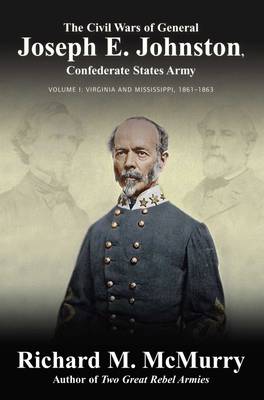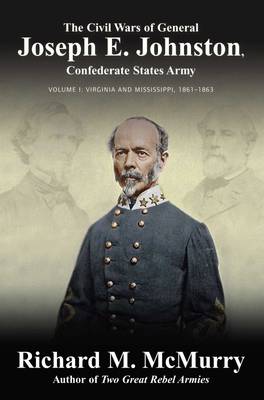
- Retrait gratuit dans votre magasin Club
- 7.000.000 titres dans notre catalogue
- Payer en toute sécurité
- Toujours un magasin près de chez vous
- Retrait gratuit dans votre magasin Club
- 7.000.0000 titres dans notre catalogue
- Payer en toute sécurité
- Toujours un magasin près de chez vous
The Civil Wars of General Joseph E. Johnston
Confederate States Army - Volume I: Virginia and Mississippi, 1861-1863
Richard M McMurry
Livre relié | Anglais
36,45 €
+ 72 points
Description
Joseph Eggleston Johnston was one of the original five full Confederate generals. He graduated West Point in the same 1829 class as Robert E. Lee and served in the War with Mexico, the Seminole Wars in Florida, and in Texas and Kansas. By 1860 Johnston was widely looked upon as one of America's finest military officers. During the Civil War he commanded armies in Virginia, Georgia, and the Carolinas and served as commander of the entire Western Theater during a critical period of the war.
Johnston's contributions to the war effort, however, remain a lightning rod of controversy. In The Civil Wars of General Joseph E. Johnston, Richard M. McMurry argues persuasively that the Confederacy's most lethal enemy was the toxic dissension within the top echelons of its high command. The discord between General Johnston and President Jefferson Davis (and others), which began early in the conflict and only worsened as the months passed, routinely prevented the cooperation and coordination the South needed on the battlefield if it was going to achieve its independence. The result was one failed campaign after another, all of which cumulatively doomed the Southern Confederacy.
McMurry's study is not a traditional military biography but a lively and opinionated conversation about major campaigns and battles, strategic goals and accomplishments, and how these men and their decision-making and leadership abilities directly impacted the war effort. Personalities, argues McMurry, win and lose wars, and the military and political leaders who form the focal point of this study could not have been more different (and in the case of Davis and Johnston, more at odds) when it came to making the important and timely decisions necessary to wage the war effectively.
The Civil Wars of General Joseph E. Johnston represents a lifetime of study and contemplation that captures Johnston in a way that has never been accomplished. It sheds fresh light on old controversies and compels readers to think about major wartime events in unique and compelling ways. This first installment begins just before the Civil War and ends on the eve of Johnston taking command of the Army of Tennessee in North Georgia.
Here, finally, is the definitive study of how qualities of character played an oversized role in determining the outcome of the Civil War.
Johnston's contributions to the war effort, however, remain a lightning rod of controversy. In The Civil Wars of General Joseph E. Johnston, Richard M. McMurry argues persuasively that the Confederacy's most lethal enemy was the toxic dissension within the top echelons of its high command. The discord between General Johnston and President Jefferson Davis (and others), which began early in the conflict and only worsened as the months passed, routinely prevented the cooperation and coordination the South needed on the battlefield if it was going to achieve its independence. The result was one failed campaign after another, all of which cumulatively doomed the Southern Confederacy.
McMurry's study is not a traditional military biography but a lively and opinionated conversation about major campaigns and battles, strategic goals and accomplishments, and how these men and their decision-making and leadership abilities directly impacted the war effort. Personalities, argues McMurry, win and lose wars, and the military and political leaders who form the focal point of this study could not have been more different (and in the case of Davis and Johnston, more at odds) when it came to making the important and timely decisions necessary to wage the war effectively.
The Civil Wars of General Joseph E. Johnston represents a lifetime of study and contemplation that captures Johnston in a way that has never been accomplished. It sheds fresh light on old controversies and compels readers to think about major wartime events in unique and compelling ways. This first installment begins just before the Civil War and ends on the eve of Johnston taking command of the Army of Tennessee in North Georgia.
Here, finally, is the definitive study of how qualities of character played an oversized role in determining the outcome of the Civil War.
Spécifications
Parties prenantes
- Auteur(s) :
- Editeur:
Contenu
- Nombre de pages :
- 360
- Langue:
- Anglais
Caractéristiques
- EAN:
- 9781611215922
- Date de parution :
- 05-01-23
- Format:
- Livre relié
- Format numérique:
- Genaaid
- Dimensions :
- 157 mm x 218 mm
- Poids :
- 612 g

Les avis
Nous publions uniquement les avis qui respectent les conditions requises. Consultez nos conditions pour les avis.






